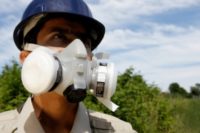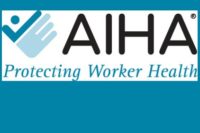Calling all mentors
Have you found yours?

I was so naïve in the early part of my career that I graphed the above. On one axis was a timeline of achieving credentials matched with the other axis showing expected pay. What I was paid for what I did was my sole measure of success. It was not until a career mentor entered my life that I learned that measurement by pay distracts from higher career fulfillment.
My mentor
Dr. Stephen K. Hall was the product of a British father and a Chinese mother. He grew up in Hong Kong. His family in China had great wealth but education was prized over money. In those terms Steve was extremely rich; earning degrees with honors from universities including Harvard. He was fluent in speaking Japanese, both dialects of Chinese, French, and of course, English. He was primarily trained as a toxicologist. As a CIH he didn’t worry about CM points. When it came time to renew the credential, he just retook the exam and was always certain to pass.
I first met Dr. Hall when I was a student at the Medical College of Ohio and where he was the program director in occupational health. I won’t go into the reasons why, but Steve took a special interest in my career. He routinely challenged me to think, not just do. “Strategy must precede tactics,” and “think deeper” he often reminded me.
Steve especially wanted me to think and act globally. When Steve and I traveled to Taipei ROC, in 1991, to help prepare the country for chemical disasters, I still vividly recall when he arranged for the hotel restaurant to stay open for him after closing, so he and the wait staff could instruct me in the proper etiquette for dining in China. Steve was a stickler on manners and appearance. Trying to teach me humility was his greatest challenge.
Steve’s been gone for many years. He died of bladder cancer. True to his remarkable character and intellect, when I would visit him in the hospital he continued to challenge me to think. “Dan, I felt flushed after a blood transfusion, can you explain why?” Didn’t matter what I said, his comeback was always, “think deeper.” And into a deep discussion we would go. One day when I couldn’t talk to Steve because I was busy with travel, I had my wife call him. Steve thanked my wife for the call and told her to tell me goodbye; as he was going to die that day — and he did.
What’s a mentor?
In the pursuit of your EHS career you will encounter many advisors. Mentor, however, is unique. Wikipedia describes a “mentor” as a term meaning “someone who imparts wisdom to and shares knowledge with a less experienced colleague.” Many advisers may share knowledge. Imparting wisdom, often without knowing it, is the true mark of a mentor.
Career pyramid
Perhaps because Steve understood wealth, he would sigh whenever I would boast about how much I was paid. After showing him my graph of expected income, we had another deep discussion of how to better define and measure my career ambitions. The result is the pyramid shown on this page.
Since I am often distracted with learning, Steve set up the pyramid as a mnemonic device, each word begins with “E”, to aid in information retention. Each box builds and supports the career emphasis objective above and each box is roughly divided into ten year periods.
Epitaph is an end-point and is self-explanatory. Expire is a period of diminishing career activity. Education, Experience, and Exemplary are somewhat self explanatory. Expatiate is the career emphasis I’m at now — and it will require an explanation.
Freedom
Expatiate means to “move about freely or travel at will” and “to speak or write at length or in detail.” My deep discussions with Steve revealed what I really want from my EHS career. Deep in my personality, I don’t want people dictating or controlling my life and I deeply want to share knowledge. Steve and I settled on expatiate for all it means. Key decisions I made and make in my career support expatiate activities now. For example, I’m often asked if I would be willing to rejoin the corporate world where pay would be more certain and perhaps more than I earn now as a consultant with my own business. You know enough now to know my answer.
Hierarchy of needs
The knowledge that Steve shared with me included a deep appreciation for what is known as STEM today — science, technology, engineering, and mathematics; particularly as they relate to toxicology.
I now understand the wisdom Steve imparted to me. The pyramid Steve helped me prepare for my career can be overlapped with Maslow’s pyramid that illustrates “Hierarchy of Needs.” My early career focus on credentials and pay would never allow me to reach self-actualization — “a level of need that pertains to what a person’s full potential is and realizing that potential (Wikipedia).”
Self-actualization
Steve knew me. He knew that if he dictated me to adhere to Maslow’s theory of needs I would likely fail to embrace it, preferring to go my own way. Steve also trusted me. He trusted me that if we developed a career plan, I would stick to it. And I have.
Looking for a reprint of this article?
From high-res PDFs to custom plaques, order your copy today!






